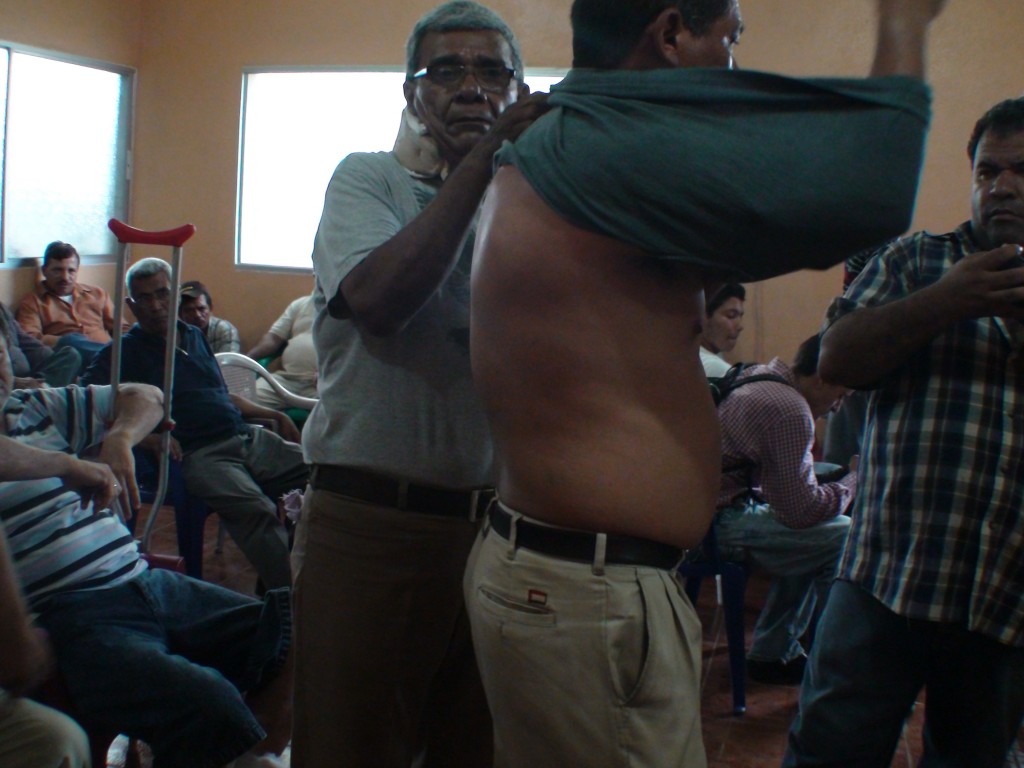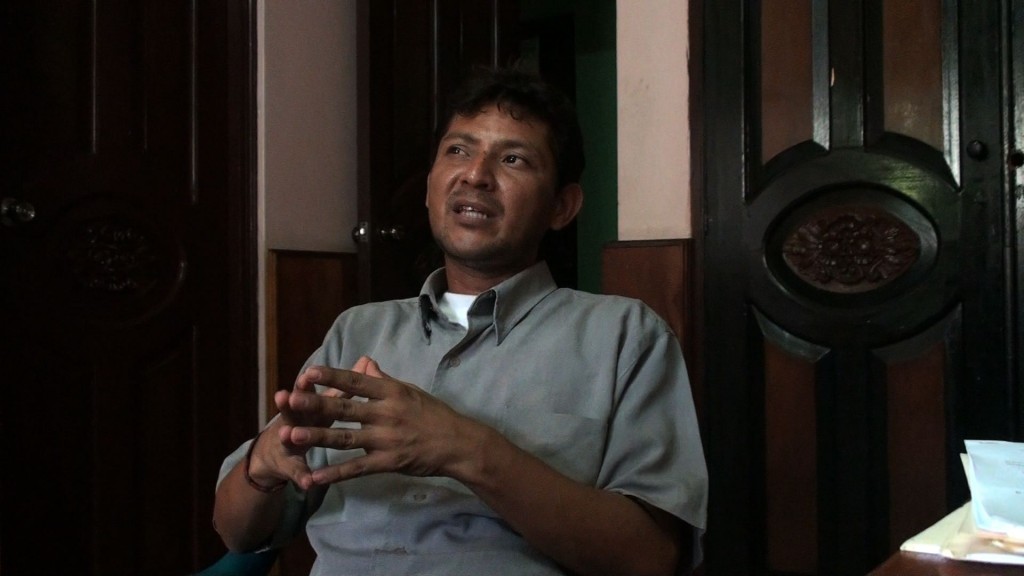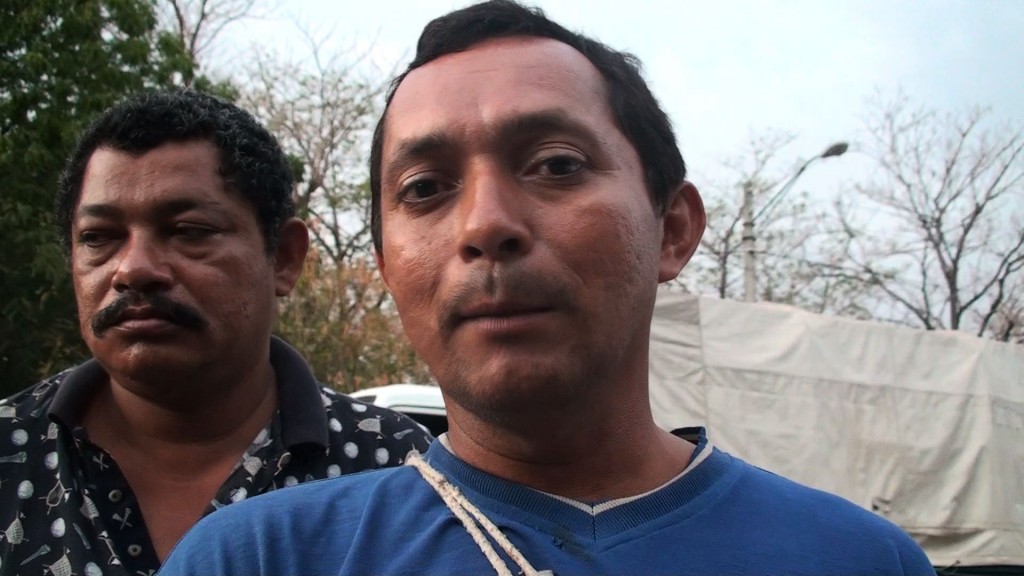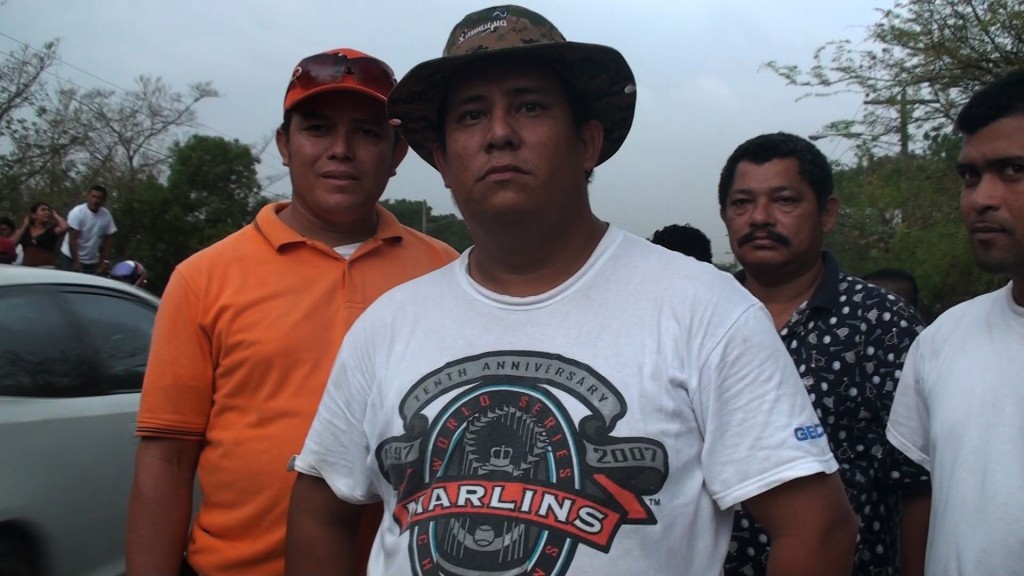Update: Today, Saturday May 17th, the strike has ended after 12 days. Transport workers will get subsidies of 1.30 USD/gallon, but cargo transport will be excluded from that offer as they are “not regulated”. Where the money for that suddenly comes from is unclear.
The Central American Republic of Nicaragua was in the 1980s portrayed as one of the greatest communist threats in the western hemisphere. Once the political right won presidential elections in 1990s, the ideological education so many had received for a decade suddenly didn’t seem to have mattered. That is until now, in May 2008 little more than a year after the Sandinistas regained the presidency with a promise of national reconciliation, when transport workers take to the streets, shut down all public transport built barricades on major highways and demand for the government to go back to politics of price control and subsidization. Now running on its 9th consecutive day with all talks between drivers and government not anywhere close to a positive the solution, the immediate future of Nicaragua is uncertain.

The strike started on May 5th. The first day only busses between major cities stopped while city busses and taxis in Managua as well as busses between minor destinations continued to operate. Since then all transportation has been shut-down with the exception of occasional pirate taxis. In the city of León drivers have set up camp at the exit of the highway to Managua, and most afternoons they block each lane for ten minutes at a time to stop most traffic, although only past Tuesday did it end up with violent confrontations between police and demonstrators.
The demand brought forth by the transport cooperatives are frozen petrol prices at the equivalent of 2.88 USD/gallon or 0.49 Euro/L for public transport, as they claim is the case for those operating in Managua already. Currently prices run around 5.18 USD/gallon or 0.88 Euro/L. The money that is to be used on this is the money that the government allegedly has access to through an oil deal with Venezuela which lets the country buy oil at market price, but with only 50% having to be paid within 90 days and the remainder in 23 years with an extremely low 2% interest rate. The government on the other hand claims that there isn’t sufficient funding available for such heavy subsidization and that part of the available funds are to be used for other projects, such as anti-hunger measures, micro-credits for small shop owners and road infrastructure measures.

Demands
At the camp of transport workers in León, Marcel Olarius, spokesperson for a bus drivers cooperative, explains the dilemma: “The cost of one gallon of petrol is getting close to 100 cordobas. Our research shows is that what is just and what we want is a price between 55 and 60 cordobas per gallon.” Another spokesperson, Mariuna Lido Parafon, adds “We are transport workers of León and we strike for the freezing of petrol prices for public transport and cargo to prevent an increase in living expenses. All we want is the same benefits Managua is getting already of 40.50 cordobas per gallon. […] Without transport we Nicaraguans are practically paralyzed.” The subsidizing of transport in Managua, that is already in place, is what seems to make them sure that it would be economically viable.
Carloberto Rodrigo of the Communication and propaganda department of the FSLN (Sandinista National Liberation Front) León believes that such demands are based on “a misinterpretation of the global situation”. He explains: “What is happening about the increase in the price of petrol. The first demand of transport workers is a halt in rise of oil gas prices. You know that gas prices are shooting up. just like prices rise, because we’re not an oil producing country, we depend on what we can buy. So there is no way we can freeze prices. No part of the world can do that — including the first world. There is a dynamic between the increase in living standards and the increase in oil prices.”
And also, the distribution of available funds is matter of prioritization, as Rodrigo continues: “the oil that is coming form Venezuela is not only to subsidize transport. In Managua, given the special character of the town, we’re subsidizing the buses. And still the fare there only costs 2.50 cordobas [0.13USD/0.08Euro].”

Transparency
But how much money is actually available is another concern of the strikers. As Ilton Lara, spokesperson of a cooperative in the city of León, explains: “We’re asking for transparency about the funding that comes from Venezuela, and he [Ortega] isn’t. He doesn’t show the data about how much is received, how much is spent? the economic data. ” The economic agreement with Venezuela that is set up through the Alternative Bolivariana para los Pueblos de Nuestra América (ALBA) has been repetitively been criticized in the daily press as providing the president with a second budget, which he can use without parliament approval, and which is also unaccounted for. That smells like corruption or misuse to the transport workers. But where the money exactly goes is matter of speculation.
As Olarius puts it: “Chavez is sending cheap oil to Nicaragua, and Daniel Ortega then simply sells that at other prices and we believe that our president is helping neighbors like Honduras with oil that was supposed to be used by us. What we also want is for the ALBA funds to be reviewed. Daniel Ortega doesn’t want to show where the ALBA money is going. The help that comes doesn’t stay in the country, it simply goes directly into his pocket.”
These arguments can be heard a lot, and are largely based on newspaper articles saying that gas prices are somewhat cheaper in Honduras, who is receiving its oil through Nicaragua.
Rodrigo denies the charge of corruption: “We have a strategy on how to use the Alba money. It’s the ‘no hunger’ and ‘no abuse’ [micro loans] programs? Also we have a strategy of helping the small producer. Yes, they’re small those who are being helped. But those are those who in reality didn’t have the possibility to produce. We have a population of sixty percent who live in poverty. Thirty-five percent live in extreme poverty. These are the ones who are being helped with these Alba funds. it’s all defined in the plans.”
Also, he feels that the criticism is unjust: “The price of petrol in Honduras is [only] 25 cents cheaper. And with the current talks going on, we’re reaching the same level here. See what happened is that in Honduras the state is handling the oil. Here in Nicaragua we still have to deal with the multinationals. And they influence the price level. At this time we’re negotiating. [And] what we’re offering now is a decrease in twenty percent. And also we’re talking about what other things we can subsidize with the money from Venezuela.”
Food prices
All the transport workers claim that their demands are really for the benefit of the entire population. Olarius illustrates: “This is not only a problem of transport; it affects the entire population in general. With these high price levels of oil, food prices increases.” Lara is a bit more specific: “Here in Nicaragua we have two prices that are extremely important for everything else: the price of the US dollar and the price of gas. If either of them change, suddenly everything becomes more expensive, including basic foods.”
Rodrigo emphasizes though that a strike while it’s in effect doesn’t help the poor: “The people also see that the transport workers aren’t thinking of the good of the people. We have now had nine days of strike, which has affected the life of the poor people in some way or other.” In the longer run though, Lara defends their actions as being socially just: “If we were to apply the laws of the free market as well, we would give the increased cost of gas on to the passenger. But the students and people taking our buses don’t have the money for higher fare prices. We can’t do that, we actually have a social consciousness.”
Food prices have indeed increased markedly over the last 1.5 years since I was here last time, as has everything else, and urgent action is needed. Asking Rodrigo what plans the government has, he explains: “In the last meeting we had two resolutions to stimulate production in the countryside and to prevent basic foods from leaving the country. At the moment there is no institution that is overseeing the trade, and those with more money buy up for export, which leads to a crisis for this government. Therefore right now we’re creating institutions like Enabas [Nicaraguan Basic Foods Company], that will control the price of these products.”

Enabas was created in the 1980s, and was throughout that decade used to control prices for basic foods. In 1983, Enabas controlled around 40% of all food distribution, mostly in poorer neighborhoods. Enabas has existed since then, but not used very actively by the various governments. A return to planned economy, even in a mixed economy setting, would mark a large step away from the current ideal of “open” economies in most countries.
Violence
Although the strikers aren’t physically attacking the police, with the erection of barricades across the streets they are clearly impacting traffic, at least to a minor degree, which is the reason the police ha been placed at their camp. it only came to confrontations one day, Tuesday last week, and all the police men I speak to show understanding for the cause of the strike.
At a press conference at the bus terminal to which some the taxi drivers take me, I am presented with the various injuries people have received. I am the only person with a video camera, so everything is centered around me and my camera. Some elderly men take their shirts of and show some blue marks, two students show a slight mark on on their rib cage, a guy who otherwise seems fine presents a bottle of gas that was supposedly used to attack him. Altogether, I have seen worse after confrontation between police and demonstrators in Oslo, Norway. “Never in my life have I seen anything like what happened here last Tuesday,” one guy who joins us in the taxi says. At the conference itself, this “massacre” by the government is likened to the repression and shooting of Sandinistas by the Somoza government in the 1970s.
Turcius puts it this way: “Now we are also fighting against the repression. Last Tuesday they took 120 prisoners and beat us.”
In the meantime though, police and demonstrators joke with oneanother, laugh a lot and generally seem to enjoy their time.
Sandinista Internal
And there might be a reason for that: Most of the police are Sandinista. And so are the transport workers. And the politicians they strike against. And the judges in whose courts they might be trialed.
“We are leftwinger,” Lara explains, “the majority of transport workers in Nicaragua have been leftwingers. For 16 years we have supported Daniel Ortega during the government of the political right. And why? So that he could take power and help those stuck in poverty. But what has happened? Although Nicaragua is allied with Venezuela, which is another leftwing government. What he is doing is the direct opposite. He speaks like a leftwinger, but what he actually does is neoliberalism. So we feel deceived by the government we have now… We believed that he would help other leftwingers, once he was elected. That is why we are on strike, with out hearts hurting. It was us who put that government there.”
Each cooperative only consists of between 20 and 120 cars, an ownership structure they owe to the Sandinista government in the 1980s, but Lara’s sentiments seem to be shared by most transport workers I meet. Sandro Napeloen Turcius, another spokesperson, says it even more directly: “we are of the Sandinista party. And the government is Sandinista — that’s why we’re trying to send a message to the president? This [strike] is not political, but at the end of the day it is true that we are sympathizers of the Sandinista party. Since we started this cooperative, we’ve always worked in solidarity with the campaigns of the party. So right now we’re quite surprised that they’d repress us…”
Others are more practical. I ask Olarius after he has been emphasizing the advantages of ALBA at great length: “Are you guys Albanistas, then?” Olarius: “Oh no, it’s just that if you offered the best option, I’m going with you. And this is the best option we have.” The Sandinista party that is.
The political right
But if they all agree on their basic ideology, why would they get into this strike?
The party, and Rodrigo as its spokesperson, clearly see the the strike as really helping the political right. As a secondary reason for the the strike, he therefore mentions “destabilization of the government”. That is not to be understand as being the transport workers ultimate goal, they wanted their policy reforms. Rodrigo continues, “so initially that was what it was about. A political struggle taken out on the streets. But the political right tries to use this in order to destabilize the government of Nicaragua. They have bad intentions and they’re trying to use this crisis against us.
Also who is financing the strike is the US embassy. They and the right wing deputies give their money to the unions of the transport workers, of which some are Sandinista, in order to continue the strike. Because if you don’t have any money, you can’t maintain a strike. They do this mainly on order to make chaos and to destabilize the government.”
Internally, the Sandinista party might have a communication problem. They lost their newspaper La Barricada in the 1990s, and now only two right wing papers exist “El Nuevo Diario” and “La Prensa”. Although readership is low, and the party still has control over a number of radio and tv stations, what is written in these, it is my experience is taken as fact.
Rodrigo tries to turn the whole affair mostly int a question of information flow: “There is a problem of disinformation. What the right let out in this media campaign against the government, like in many Latin American countries with progressive governments, is to disinform the people. For example they’re saying that the current government doesn’t maintain the same level of external help the way former governments did. That’s not true. Last year was when the programs of the former government concluded and so that is what the statistics show.
What the political right is using the media for is to disinform the people and create a chaos. See the media here in this country doesn’t work according to the interest of the country, neither of the government nor the people. Rather they are media who work according to the interests of the families behind. Like La Prensa — the Chamorro family, and El Nuevo Diario — as well the Chamorros. They have a lot to say throughout the history of Nicaragua. They are servants to the US government.”

Ever Sandinista again?
Although both groups talk about price controls, the conflict seemed to me to have reached a level where reconciliation between the two parts seems unlikely. I ask some transport workers, and their answers are different. Some say that this is about getting the party back on track. Others say that the president needs to be shifted out. Only one says that they’ll now go and vote for the political right.
Rodrigo is more optimistic: “Yes of course [is it possible that the transport workers will vote for the Sandinistas again] It’s only because of the Sandinistas that they [the transport workers] have obtained this unity. before the revolution, poor people couldn’t take taxis. Before the revolution, the transport workers were an elite. It’s because of the revolutionary process that they obtained this unity. I’m sure that this process of negotiation will make them realize that this is really their government. And we’ll get out of this even stronger, to continue to rebuilt the revolution.”
Who to trust?
When I fist encountered the strike I was in Managua, last Monday morning. I had read about it previously, but only thought of it as a theoretical possibility. Now I suddenly had all my luggage, including a rather bulky video camera and computer and needed to move from Managua to León. I sat at the bus stations for about an hour, with various Nicaraguans who all expected the strike to be over later that morning. I ended up joining a smaller group, taking a taxi to the village of Israel and then the bus on to Chinandega from there, getting out while passing through León. At that time, still everyone just saw this as just slightly out of the ordinary. It was before any kinds of barricades were erected, and before milk and other goods were getting contained in their production places and restricted from moving on to consumers. Still today, fruits and most other goods can be bought in the streets at their usual rates. The most exciting event in downtown León yesterday was a parade in connection with a Miss La Salle (a school) contest moving through the streets. But the situation overall has gotten more seriously. The university I was supposed to start teaching English at, is now closed for its second week in a row. The other university, where I recently taught Linux science (in Spanish!) has been closed for the first week, and although students from outside the city likely wouldn’t be able to make it, had to open this week, in order to remain in the ordinary exam schedule.
Every afternoon I go out to the strikers, trying to see what they’re up to. But whom to support, I really don’t know. True, I still have the feeling that I haven’t seen completely where the Venezuelan money goes, and also I get the feeling that it might not all be benefiting the population at large. Ont he toehr hand — if one is to prioritize, why would one subsidize the gas of taxis? Food transport and buses, ok, but taxis?
Also, the intervention from the political right seems suspicious to me. Of course it’s easy for the Rodrigo to push all the guilt for everything that fails onto them. but it is true, that the papers have been in favor of the strike, and liberal party leaders have gone on radio with their support for it. A few days ago, I was sitting at the strike with the journalist of La Prensa. Given that I’m the only foreigner around there, I’m accepted as one of theirs. I asked him: “But seriously, you guys write that economists say that it is viable to subsidize petrol. But if you [the political right] were ever in charge, you wouldn’t even consider subsidizing anything — you want the free market, isn’t that right?” “Oh, of course he replied. This is a struggle amongst the Sandinistas.” He spoke a while about how bad the service of the bus drivers actually was and that they really didn’t deserve more. And then he went on to show me his camera that someone had sent him from Spain.

Wow that does sound like a big mess without a clear outcome…but I have to give them props, they are willing to strike! I wish Americans still had that type of activist attitude!
a big mess without a clear outcome…but I have to give them props, they are willing fggggggggggg